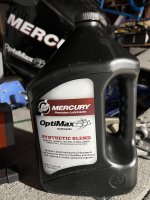A Problem though, is at the time of Introduction, 25 yrs ago, there were no Oils specific for the DI Engines, and both OMC and Mercury were saying to use TCW-3. As it is well known, the TCW-3 Spec was quite old back in 1998, and all TCW-3 Oils were not the same.
Agree... but TCW-3 was not the specification, per say.
They specified a Synthetic Blended oil (Mercury Premium Plus, my favorite at the time) and advised against the use of Mercury Premium (dino oil), their primary TCW-3 rated product at the time.
There were Rumours about a TCW-4 spec, to cover DI Requirements, but that never happened. OMC-BRP and Mercury eventually did Market DI specific Oils, and they far far exceeded the TCW-3 spec, even though they didn't display the TCW-3 cert.
To keep carbon buildup to a minimum, Mercury spec'd a Synthetic Blend oil (Premium Plus) and recommended the use of the carbon guard additive. ie Mercury Quikleen.
As one would expect, you can count the number of people who regularly used a carbon additive on one hand.....thus the need for a DFI "rated" oil.
*Note the explanation of the difference between "high quality 2-cycle engine oils" and OptiMax / DFI oil is noted in the Service Bulletin below:
"Effective October 2010, Mercury OptiMax / DFI or Quicksilver DFI 2-Cycle engine oil is the recommended oil for all OptiMax models - including Pro XS. (The previous recommendation stated the use of Mercury Premium Plus 2-Cycle Outboard Oil in ProXS models and OptiMax oil in non-ProXS models.)
OptiMax / DFI oil is a superior oil when compared to the Premium Plus oil. While both products are high quality 2-cycle engine oils suitable for use in OptiMax engines, the OptiMax / DFI oil contains a higher percentage of additives that reduce carbon deposit formation."
The US has a few oddball Laws that prevent the Engine Makers from being able to say only one Oil be used.
Assuming you're talking about Magnuson-Moss
Not exactly......manufacturers are not allowed to use "tie-in" sales provisions as a condition of warranty. Tie ins are provisions that state or imply that a consumer must buy or use Products, Goods or Services from the manufacturer to keep their warranty coverage intact.
As a Manufacturer, you can require the use of Products with particular qualities or properties, but you can't require factory Service, proprietary Goods and or Products as a condition of warranty unless the Product, Goods or Services are provided free of charge.




















